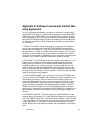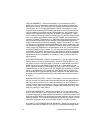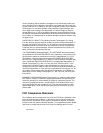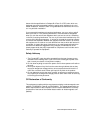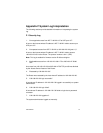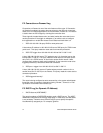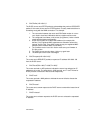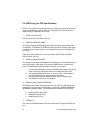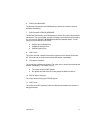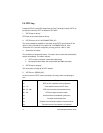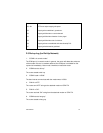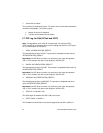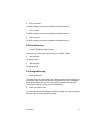
74 Asanté FriendlyNET Cable/DSL Router
F.2 Connection on Demand Log
Connection-on-Demand is one of the main features of the router. If Connection-
on-Demand is enabled, the router does not connect to the ISP until a client acti-
vates his or her Internet applications, such as browsers, mailers etc. This feature
is useful when the ISP charges by counting the connection time.
These logs tell the administrator who (and what) makes the router start its con-
nection procedure. If the trigger is unwanted, try to ask the users to configure
their applications or enable the Access Control feature to block them out.
1. “DOD:192.168.123.100 query DNS for
www.yahoo.com
”.
A host whose IP address is 192.168.123.100 sent a DNS query for FQDN “www.
yahoo.com”. This query made the router start its connection procedure.
2. “DOD:TCP trigger from 192.168.123.100:1234 to 204.71.200.74:110”.
A host (192.168.123.100) sent a TCP packet to port 110 of another host on the
Internet (204.71.200.74). This query made the router start its connection proce-
dure. Port 110 is POP3 service. A user tried to access his/her emails. Users
configure their mailers to check email periodically. It may cause the router to be
triggered periodically if disconnect-when-idle is enabled.
3. “DOD:prot 1 trigger from 192.168.123.100 to 204.71.200.74”.
A host (192.168.123.100) sent an IP packet whose protocol number is 0x1 to
another host (204.71.200.74) on the Internet. This query made the router start its
connection procedure.
4. “DOD:triggered internally”.
The router is being configured as auto-reconnection or the system administrator
forced the router to connect to Internet by clicking “Renew”, “Connect” or “Dial-
Up” buttons on the Web User Interface (UI).
F.3 DHCP Log (for Dynamic IP Address)
1. “DHCP:discover(HOSTNAME)”.
The router broadcast a DISCOVER packet to seek a DHCP server. The HOST-
NAME was configured at the Primary Setup page. In most case, the Host Name
is not necessary. However some ISPs will require you to specify the specific
Host Name they assigned you. For example, @Home.




